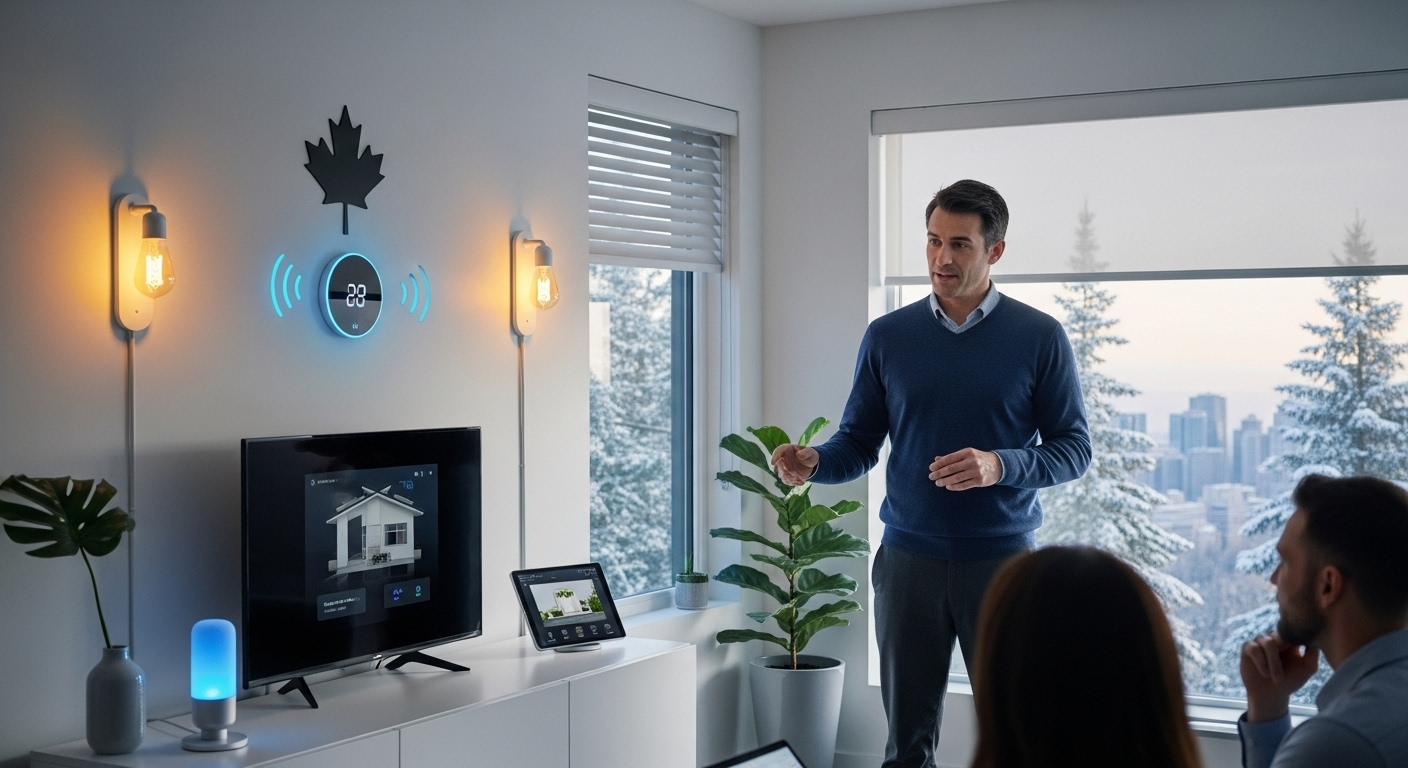Home Automation Training In Canada

Home automation, often called “smart home technology,” allows you to control and automate various aspects of your home, from lighting, heating, and security systems to entertainment and appliances, using your smartphone, voice commands, or preset schedules. Imagine walking into a warm house on a chilly Canadian winter morning, lights adjusting automatically, and your coffee brewing, all without lifting a finger. That’s the power of home automation.
Why You Should Read This Guide
If you’re curious about turning your home into a smart, efficient, and secure space, or even considering a career in home automation, this guide is for you. Whether you’re a DIY enthusiast, a student exploring tech careers, or a professional looking to upskill, we’ll walk you through everything you need to know: the latest trends in Canada, top training programs, career opportunities, and practical tips for getting started.
By the end, you’ll have a clear roadmap to master home automation and leverage the booming Canadian smart home industry.
Home Automation Industry in Canada
If you’ve been keeping an eye on Canadian tech trends, you’ll notice one thing: smart homes are growing fast. Home automation is no longer just a “nice-to-have” for tech enthusiasts—it’s becoming a standard in many Canadian households. From Toronto condos to Vancouver townhouses, Canadians are embracing smart lighting, security cameras, thermostats, and even voice-controlled assistants like Amazon Alexa and Google Nest.
2.1 Market Trends and Growth in Canada
According to industry reports, the Canadian smart home market is projected to grow steadily over the next five years, with adoption rates highest in Ontario, British Columbia, and Quebec. Canadians are especially drawn to devices that improve home security, energy efficiency, and convenience. With government incentives for energy-saving devices and a growing interest in eco-friendly tech, smart thermostats and energy monitoring systems are seeing a real surge in demand.
Popular Smart Home Technologies in Canadian Homes
Here’s what’s hot right now:
Smart Thermostats: Nest, Ecobee, and Honeywell systems help Canadians save on heating costs during our long winters.
Security Systems: Ring doorbells, Arlo cameras, and fully integrated alarm systems are becoming mainstream.
Lighting & Automation: Philips Hue and LIFX smart lighting make it easy to control your home from your phone.
Voice Assistants: Alexa, Google Assistant, and Siri are popular for controlling multiple devices hands-free.
Key Canadian Home Automation Companies
Canada isn’t just importing smart tech, we’re innovating too. Companies like Ecobee (Toronto-based smart thermostats) and Abode Systems (security solutions) are leading the way. Additionally, many local electricians and tech service providers are offering specialized home automation installation services, which is creating a strong job market for trained professionals.
Home Automation Training Options
If you’re serious about starting a career in home automation or just want to level up your skills, Canada has several training options—both online and in-person. Here’s what you need to know:
Online Courses and Certifications
Online training is a great starting point, especially if you’re balancing work or school. Platforms like Udemy, Coursera, and even LinkedIn Learning offer courses on IoT, smart home installation, and automation programming. Some courses even include Canadian electrical codes and safety practices, which is essential if you plan to work professionally.
In-Person Training Programs Across Canada
For hands-on learning, in-person programs are ideal. Colleges in major cities—like George Brown College in Toronto or BCIT in Vancouver—offer workshops on smart home technology. These programs usually include practical labs where you can install devices, configure networks, and learn troubleshooting techniques.
College and University Programs
If you want a more in-depth, career-focused path, some Canadian universities offer courses in Electrical Engineering, IoT, or Home Technology Integration. These programs often include certifications recognized by employers, giving graduates a real edge in the job market.
Workshops and Bootcamps
Bootcamps and weekend workshops are perfect for tech enthusiasts or DIYers. They are shorter than full college programs but still cover essentials like network setup, smart lighting, security integration, and voice assistant configuration. Many local tech hubs or community centers in Canada host these sessions, and they’re a great way to meet industry professionals.
Skills Required for Home Automation Professionals
If you’re looking to get into the home automation space here in Canada, there’s a mix of technical know-how and practical skills you’ll need. The field is growing fast, so building a strong foundation now can pay off for years to come.
1. Networking and IoT Fundamentals
At the heart of every smart home is connectivity. You’ll need to understand how Wi-Fi, Zigbee, Z-Wave, and Bluetooth devices communicate. For Canadians, this often means dealing with both urban and rural internet setups, rural homes may have slower internet, which affects smart device performance.
2. Smart Device Installation and Configuration
From smart lights and thermostats to advanced home security systems, you’ll need hands-on skills to install and configure devices correctly. This includes understanding wiring standards here in Canada and ensuring devices are compatible with local energy codes.
3. Home Security Systems
Security is a big concern for Canadian homeowners. Knowing how to set up cameras, sensors, alarms, and automated locks safely, and in compliance with privacy laws, is crucial. Familiarity with Canadian privacy regulations, like PIPEDA, will set you apart.
4. Voice Control and Automation Systems
Voice assistants like Amazon Alexa, Google Home, and Apple HomeKit are extremely popular. You’ll need to know how to integrate them seamlessly, so clients can control lights, music, thermostats, and security with a simple command.
5. Energy Management and Sustainability
Canadians are increasingly eco-conscious. Knowing how to integrate smart thermostats, energy-efficient lighting, and solar or battery storage systems is not just trendy—it’s in demand. Smart energy management is a skill clients are willing to pay for.
Pro Tip: Practicing in your own home first is a great way to gain experience. Canadians often start with simple smart lighting setups, then graduate to full home automation systems.
Choosing the Right Training Program in Canada
Finding the right home automation training can feel overwhelming, but it’s worth doing your homework. Here’s what to look for:
Accreditation and Certification Considerations
Canada doesn’t have a single national standard for home automation certifications, but programs from recognized colleges or tech institutes carry weight with employers. Certifications like CEDIA (Custom Electronic Design & Installation Association) are internationally respected and highly regarded here.
Cost and Duration of Programs
Courses can range from a few hundred dollars for short online workshops to several thousand for full-time diploma programs. For example, a community college smart home technology program might run 6–12 months, offering both classroom learning and hands-on labs. Consider your budget and the skills you want to gain.
Employer Recognition and Job Placement Support
Some training programs partner with Canadian companies for internships or job placements. This is incredibly valuable because home automation is a very hands-on industry. Look for programs that offer support in connecting you with local employers, especially in cities like Toronto, Vancouver, and Calgary where the demand is high.
Reviews and Testimonials from Canadian Students
Online reviews and testimonials give you an idea of what to expect. Ask if past students have successfully landed jobs, installed real projects, or started their own businesses after the course. Canadians tend to appreciate programs that include local regulations and energy codes in the curriculum.
Pro Tip: Blending online courses with local workshops is often the best approach. You get flexibility while still gaining hands-on experience that employers respect.
Canadian Regulations and Standards for Home Automation
When diving into home automation in Canada, it’s essential to understand the rules and regulations that keep our homes safe and our data private. Unlike in some countries where you can install anything you want, Canada has strict standards, especially when dealing with electricity and connected devices.
Electrical Safety Standards
Any home automation system that connects to electricity, like smart lights, thermostats, or security cameras, needs to comply with the Canadian Electrical Code (CEC). This ensures all installations are safe and prevent risks like electrical fires. If you’re planning DIY installations, always check whether your devices are CSA-approved. CSA stands for the Canadian Standards Association, and it’s a mark that the device meets strict safety standards.
For more complex installations, like integrating home automation with your HVAC system or security panels, hiring a licensed electrician is often required. Not only does this comply with Canadian law, but it also keeps your home insurance valid, yes, some policies can be voided if non-certified electrical work causes damage.
Data Privacy and IoT Regulations
Home automation devices collect a lot of personal data, from motion sensors to smart cameras. In Canada, privacy is protected under PIPEDA (Personal Information Protection and Electronic Documents Act). If you’re installing devices that record or store personal data, it’s crucial to choose products and cloud services that comply with Canadian privacy laws. Many Canadians prefer devices that store data locally rather than in foreign cloud servers.
Building Codes and Permits
Some provinces, like Ontario and British Columbia, have building codes that influence how smart devices are installed, particularly if you’re upgrading electrical panels, installing solar-powered devices, or integrating EV chargers. Before any major home automation project, check with your municipal building office to see if permits are required.
In short, safety, privacy, and legal compliance are key pillars of home automation in Canada. Following them ensures your smart home is not only convenient but also safe and legally sound.
Tools and Technologies for Home Automation in Canada
Canada’s home automation market has grown fast over the last few years, and there’s a ton of tech available to make your home smarter, more secure, and more energy-efficient. Here’s a breakdown of tools and technologies I recommend as a Canadian tech expert:
Popular Smart Home Devices
Smart Thermostats: Brands like Nest and Ecobee are popular in Canada because they help reduce heating costs during our long winters. They learn your schedule and optimize energy use automatically.
Smart Lights and Plugs: Philips Hue, LIFX, and TP-Link offer simple automation options. These are great for Canadians living in apartments where rewiring isn’t an option.
Security Cameras and Doorbells: Ring, Arlo, and Logitech Circle are widely used. Many devices support local storage to comply with Canadian privacy preferences.
Home Automation Platforms
Most smart homes in Canada run on platforms that centralize control. Popular ones include:
Apple HomeKit – Ideal for iPhone users and supports secure local control.
Google Home – Great for those using Android devices and Google services.
Amazon Alexa – Offers a huge ecosystem of compatible devices and voice control.
Samsung SmartThings – Excellent for integrating multiple devices from different brands.
Emerging Tech to Watch
Energy Management Systems: With rising energy costs, Canadians are increasingly investing in systems that monitor electricity use and integrate with solar panels and EV chargers.
AI and Machine Learning: Smart systems that predict behavior, optimize heating/cooling, and even suggest energy savings.
Smart Home Automation Hubs: Devices that connect everything from lights to locks in one app. This is especially useful for larger Canadian homes or those with multiple floors.
Pro Tip for Canadians
When choosing devices, consider cold-weather compatibility. Some smart locks and outdoor cameras may not perform well in extreme Canadian winters. Always check temperature ratings and whether they support local cellular networks for remote access.



